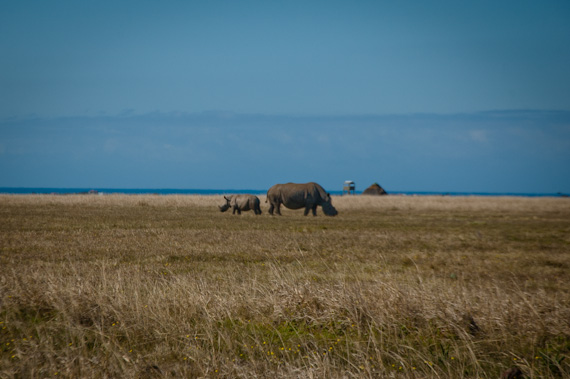
“You’re not going to Kruger National Park? Shame.”
I know, it was a shame. The near-mythical stories of wild African animals roaming the bush and crossing the rivers, attacking prey and staring tourist in the eye send a surge of excitement through most any traveler’s heart…but we knew we’d chosen to focus our trip on the Cape, and veering off course by 1,700 kilometers to go north to Kruger wasn’t in the cards.
Thankfully, there are alternative ways and places to spot South African wildlife.

Photos from our game drive in Jeffreys Bay, South Africa
The Big Five (lion, leopard, elephant, buffalo, and rhino) draw tourists from around the world. Discerning between business out to make a buck on the back of the beasts versus operations genuinely caring for the well-being of their animals becomes the challenge.
We weren’t excited to try getting close to animals tamed for the Pay, Pet, and Play act. (See more on the woes of wildlife tourism in South Africa in our previous post.) Lions and tigers and elephants trapped for tourist pat-downs and photo shoots didn’t sit well with us.
Animals in Africa may be indeed be sought after and seen and appreciated by travelers, but we believe it’s best done in an ethical way, on their turf, at a safe distance.
Thanks to the generosity of friends welcoming us to Jeffreys Bay, South Africa, we enjoyed the chance to spot giraffes, zebras njala, springbok, rooihartbees, impala, letchwe, buffalo, and more on a private game reserve.
We’re members of Servas, an international, non-governmental, multicultural peace association run by volunteers in over 100 countries. As travelers, we’ve been grateful to cross paths, share meals, and stay in homes of hosts around the world.
In Jefferys Bay, South Africa, we stayed with Servas hosts Kobus and Marietjie and met four of their friends-for-decades: Lydia, Hank, Johann, and Susan. The six were in the midst of planning a grand road-trip to Namibia, and they welcomed Ted and I into the festivities without batting an eye. In between the meals, coffee, laughs, packing lists, and last-minute shopping runs, Johann and Susan invited Kobus to bring us out for a game drive on their farm.
The next day, we found ourselves pulling up to Lombardini Lodge with Kobus and his sister Lene.

It felt a bit like home to suit up and climb onto four wheelers. My brothers would be proud.

Our Servas host Kobus getting rides squared away
Fences around vast acres…
A zip through the gate, and we were on our way…



This was closest we got to the animals over the course of the morning. These guys weren’t too bothered. They just stared right back…



 The rhinos, on the other hand? This was full-zoom on my camera, and I was still asking Ted, “How fast can you go on this thing if we need to run?!” Even from far, far away, a charging rhinoceros strikes terror into the heart.
The rhinos, on the other hand? This was full-zoom on my camera, and I was still asking Ted, “How fast can you go on this thing if we need to run?!” Even from far, far away, a charging rhinoceros strikes terror into the heart.



Acres of open field and scruffy brush…and all sorts of wild things zipping across the vista.

Highlight of the day: spotting the rhinoceros and her baby. The adult’s horn has been removed and is kept under lock and key (with permission from the authorities) to help protect it from poaching. Would you believe it if I told you they were under 24/7 armed surveillance? Rhinoceros poaching is a hugely troubling issue. Since 2008, nearly 1400 rhinos have been lost to the growing poaching epidemic.


Amazing to pop out around a corner and spot these long-necks waiting to say hello.
 All smiles after seeing zebras, giraffes, rhinos, springboks, impalas and the rest, out living their lives beyond the bounds of zoo…
All smiles after seeing zebras, giraffes, rhinos, springboks, impalas and the rest, out living their lives beyond the bounds of zoo…


Our new friend Lene, all smiles, too, after riding with her brother Kobus. Here’s to hoping I’m out on fourwheelers with my brothers when we’re in our fifties and sixties!

And, a few hours later, back to the beginning…with a camera full of fuzzy shots from all the bumping and bouncing and a few of the above keepers: best catch of the day.
Instead of supporting operations known to cut corners and provide less-than-ethical access to the five “must-sees,” insistently working our way through a narrow checklist of stereotypical animals, we were grateful for the chance to visit this private game farm and see a diversity of creatures living with access to grand expanses of land, natural foraging areas, space to retreat away from people, and opportunity to live a healthy, natural, protected life.
What are your thoughts on game farms and reserves? Would you visit one if you couldn’t make it to Kruger?
This post is part of our twoOregonians Tour the Cape series featuring quintessential and offbeat South African experiences, one-of-a-kind accommodations and beautiful B&Bs, respectful wildlife programs, social service projects, and landscape photography from the South African Cape. As always, all opinions, photos, and stories are our own; many thanks to our kind hosts and partners along the way. It was our pleasure to experience such genuine kindness and hospitality!


5 Comments
Wow – the caged animals for pats really surprises me! I just wouldn’t think that people would want that in Africa (I haven’t been but would love to go and see the animals one day). Are rhinos the most dangerous creatures you could encounter on the four-wheeler tour? It looks like really good fun but I wouldn’t want to be on one of those if I saw a lion!
By my estimation, yep, the rhinos were the most dangerous. When the one started charging (from hundreds of yards away), it sent a chill up my spine!
How awesome to see the animals put and about in the wild. That is one of my dreams too. I’ve heard about rhinos needing armed guards and that is very sad.
It was very special to see them out on vast amounts of land, living in (essentially) natural habitat. Of course, the purist in me still wishes for the opportunity to see them truly in the wild in the National Parks; but that will have to wait for another day : )
I agree, the need for guards is an absolutely shame. The poaching epidemic in South Africa has been expanding at an incredibly fast rate: I hope that progress is made soon to help deflate the market for illegally sourced rhinoceros horns.
[…] tripping along South Africa’s Western Cape, finished with game drives and indigenous forest tours and stays in treehouses, we returned west toward Cape Town, enjoying […]